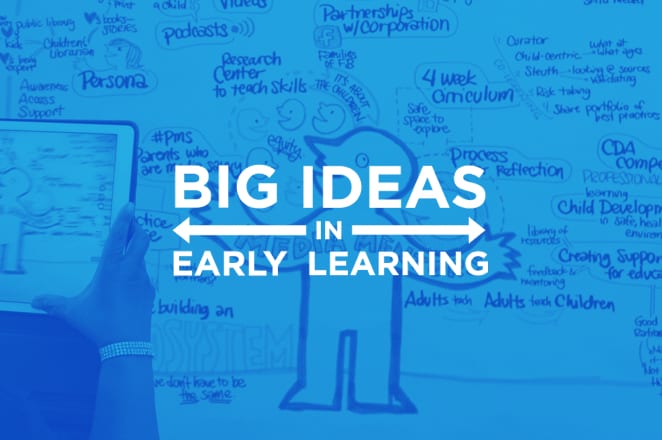Big Ideas in Early Learning
Big Ideas in Early Learning offers a one-of-a-kind experience, drawing together professionals from various disciplines in the field of early childhood education for a 3.5 day exploration of the Big Ideas that bring them together in their work.
Description
Our first annual Big Ideas in Early Learning institute is open to teachers (preschool through second grade), teacher assistants, school/center administrators, and classroom coaches.

Big Ideas in Early Learning offers a one-of-a-kind experience, drawing together various disciplines in the field of early childhood education. Over four days, you will take part in intensive exploration with Erikson Institute experts, and each day, you will be introduced to a different Big Idea, an underlying concept that will be woven into each track. Together we’ll delve deep into:
- Early math
- Literacy
- Technology
- Social emotional learning
Each day, these separate tracks will gather to explore the connections between their discoveries, making classrooms more meaningful for young children and their teachers. Included as part of the institute are an opening reception the evening of Tuesday, July 17, and a fun group excursion in Chicago the evening of Wednesday, July 18. Food, beverages, and snacks will be served daily.
About the learning tracks
When participants register, they will choose one learning track. They will meet with this track each day of the event. If a participant's desired track is marked as FULL, please choose another track. For help, please contact Matthew Zaradich directly at 312.893.7171.
For track descriptions, please read below:
Early Literacy (Two tracks: PreK-K & 1st-3rd Grade)
To become successful readers and writers, all children need strong foundations in oral language and literacy. Through this track, led by Erikson’s Language and Literacy Partners (formerly New Schools Project), you will deepen your understanding of these critical skills while gaining practical knowledge and abilities to improve teaching and learning in your classroom.
• Recognize teaching strategies that exemplify speaking, listening, writing, and reading, providing motivation and incentive to help all children achieve their potential.
• Develop a framework for and specific skills in assessing development in children’s emerging writing and reading skills.
• Make connections across content areas and learning contexts to help children revisit, extend, and deepen conceptual understandings through skills like vocabulary development, comprehension, and expression of ideas in conversation, drawing, and writing.
Early Mathematics (1st and 2nd Grade)
Dig into tools and big ideas for teaching and learning about:
• Whole numbers and ways of representing relationships among quantities.
• Meanings and methods for basic arithmetic operations.
Working collaboratively, you will explore rich mathematical situations, practice mathematizing, and use your own labeled drawings to see and solve problems. In this track, you will analyze student work, unpack common misconceptions, and examine materials that help all students see how math is useful and fun.
Social and Emotional Learning
Acquire knowledge, strategies, and specific tools for deepening and improving the social and emotional foundations of learning spaces.
This track will address and help provide understanding about both the implicit and explicit roles adults and children play during their interactions. Although early childhood practitioners have a deep understanding of social-emotional supportive education — acquired through much research and practice — this is a critical moment to reinvigorate our leading voice on this issue.
This track also will examine mindfulness practices in the classroom, the effects of toxic stress and trauma, adult self-care, and how to address cultural and structural barriers to a truly inclusive and integrated social-emotional learning approach.
Technology
Connect the big ideas in science, engineering, and math with innovative approaches to technology in early childhood. In this track, led by Erikson’s Technology in Early Childhood (TEC) Center, you will develop research-based techniques to use screen- and non-screen-based technology tools to help children investigate and explore the world around them.
• Learn how to create meaningful play and lesson plans through hands-on experiences and from STEM experts.
• Acquire skills and knowledge rooted in best practices that are included in the Early Childhood STEM Working Group’s 2017 report, Early STEM Matters: Providing High-Quality STEM Experiences for All Young Learners, and the 2012 NAEYC/Fred Rogers Center joint position statement on Technology and Interactive Media as Tools in Early Childhood Programs.
About our Wednesday Group Outing: The Chicago Architecture Foundation River Cruise
Experience the “top tour in Chicago and one of the top ten tours in the U.S.” according to TripAdvisor users. The Chicago Architecture Foundation River Cruise is a must for out-of-towners and Chicagoans alike. CAF-certified volunteer tour guides—called docents—interpret more than 50 buildings along the Chicago River. You’ll find out how Chicago grew from a small settlement into one of the world’s largest cities in less than 100 years. In 90 minutes, get the real story on Chicago architecture and its history. The best part? This cruise is only $12 for each of our guests!
What Do I Need To Bring?
Participants should bring:
- Materials with which to take notes
- Laptop and/or tablet (optional)
What Is Included?
Participants will receive materials relevant to their content area, which may include books and other items.
Breakfast is served daily. Lunch will be served Friday, July 20.
A reception is held the first evening of the series, with catered food and beverages.
Who Should Attend?
BIG IDEAS IN EARLY LEARNING is open to the public, and is designed specifically for educators working with young children from PreK to 3rd grade.